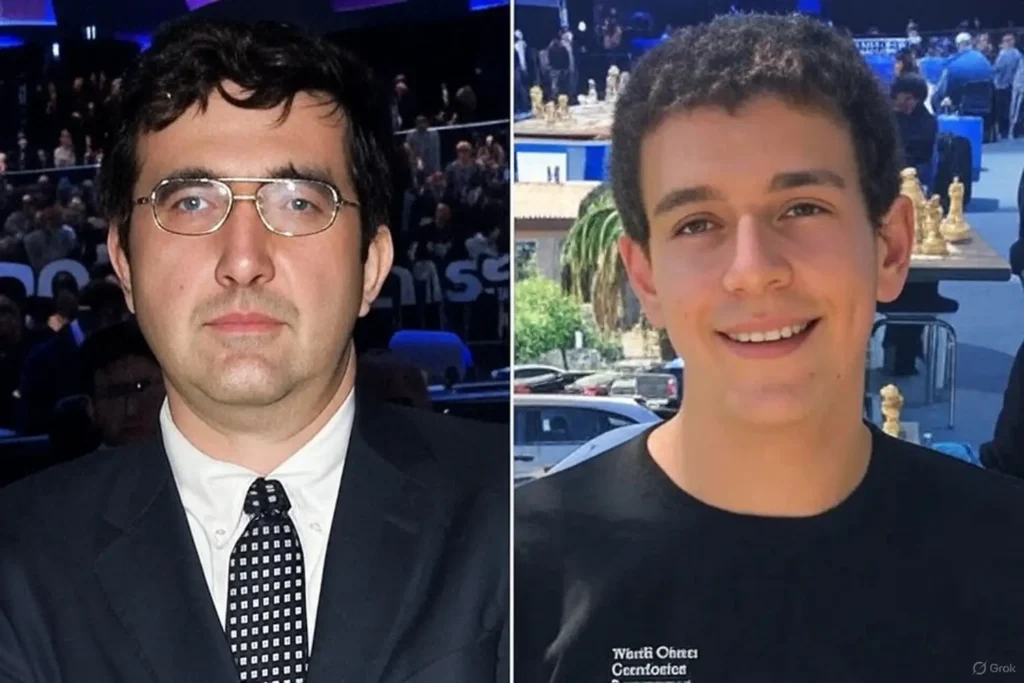Vladimir Kramnik, the 14th World Chess Champion, says his campaign to expose cheating in chess has made him a target. In a wide-ranging interview, the former world champion discussed the death of American grandmaster Daniel Naroditsky, his accusations against top platforms, and what he calls the “systemic corruption” of modern chess.
“There are dangerous people involved,” Kramnik said. “Enormous amounts of money are at stake because of my activities.”
The Anti-Cheating Campaign
Kramnik has spent the last two years publicly fighting what he describes as the growing problem of computer-assisted cheating in online chess. The rise of online tournaments, where prize funds can reach into the hundreds of thousands of dollars, has turned the virtual game into a professional arena — and, according to Kramnik, a tempting one for cheaters.
“Seven or eight years ago, online chess was a pastime,” he said. “Today, it’s a profession. But the controls are nowhere near strict enough.”
He compared chess’s anti-cheating measures to doping controls in other sports. “In tennis, doping tests are strict and random. It’s uncomfortable, but necessary. In chess, the approach is lax. And my efforts to change that face open resistance.”
Kramnik has filed formal complaints with the European Union and the U.S. Securities and Exchange Commission, alleging that Chess.com — the world’s largest chess platform — may have violated laws related to transparency and fair competition. He says the move triggered “provocations” and online campaigns against him.
The Naroditsky Tragedy
The controversy deepened after the sudden death of Daniel Naroditsky, a popular grandmaster and commentator associated with Chess.com. Naroditsky died unexpectedly earlier this year, and his passing has fueled online speculation and hostility toward Kramnik.
Kramnik says he barely knew Naroditsky personally but had expressed public concern for his well-being after watching one of his livestreams. “It was obvious he needed help,” Kramnik said. “I wasn’t attacking him. I was asking people to help him.”
When Naroditsky died, Kramnik said, “I was unanimously blamed.” He received hundreds of online threats, prompting local law enforcement to provide protection. “People are saying I poisoned him,” Kramnik said. “It’s beyond moral boundaries. It’s a criminal offense.”
He denied any personal hostility toward Naroditsky, adding that his previous public comments were “about fair play, not about the man.”
Kramnik has called for a “serious investigation” into Naroditsky’s death, noting that the grandmaster’s Twitch videos were deleted shortly before his passing. “We don’t know what happened,” he said. “We need to find out who he spoke to, what he said, what really happened that night.”
FIDE and the “System”
The former world champion has also criticized FIDE, the international chess federation, for what he sees as selective enforcement of its ethics code. “FIDE talks about preventing harassment, but they ignore open insults from some top players,” Kramnik said, referencing American streamer Hikaru Nakamura, with whom he has feuded publicly. “I filed a complaint against him. It was ignored.”
FIDE President Arkady Dvorkovich has urged players to avoid “public persecution,” but Kramnik says those statements unfairly implied that he was responsible for hostility toward Naroditsky. “It’s as if I said something bad after his death — which I did not,” Kramnik said. “I’m being threatened and insulted, but they’re checking my words.”
When asked whether he feels he’s under more pressure now than during his world championship matches, Kramnik said yes. “I went against the system. I became a danger to it. These are the people who control world chess.”
He claims that “big Western money” and corporate sponsors, some allegedly tied to criminal investigations, wield too much power over the game. “It’s not as rosy as the chess influencers make it seem,” he said. “Things are much more complicated.”
The Navara Scandal
Another flashpoint came with Czech grandmaster David Navara, who said he suffered emotional distress after Kramnik questioned the fairness of his online results. Kramnik insists his words were misinterpreted.
“When I saw he misunderstood me, I immediately wrote to explain. I offered to show him all the data,” Kramnik said. “I never accused him directly.”
Navara later said the controversy led him to dark thoughts, prompting public sympathy. “That was the first wave of the campaign against me,” Kramnik said. “The second came after Naroditsky’s death.”
He says he now faces coordinated defamation efforts and legal harassment. “My lawyers have already forced one major American media outlet to retract false claims,” Kramnik said. “Others will follow.”
Niemann and Forgiveness
Kramnik also addressed his complicated relationship with American grandmaster Hans Niemann, who was accused of cheating by world champion Magnus Carlsen in 2022. Kramnik initially refused to play Niemann, resigning after two moves in protest. Later, he says, the two met in person and reconciled.
“He took criticism like a mature person,” Kramnik said. “We met, and I realized he’s a really strong player.”
Kramnik said he never sought publicity for his investigations. “If Chess.com had answered my reports seriously, none of this would have gone public,” he said. “But they ignored me.”
“I Will Defend My Name”
Despite growing isolation, Kramnik says he will not back down. “I understand who I’m dealing with,” he said. “These are dangerous people, and enormous sums of money have been lost because of what I’ve done. But I hope everything will be alright.”
He says his family supports him, even as they endure threats and stress. “We’re sticking together,” he said. “After what happened with Daniel, we found complete understanding.”
Kramnik rejects portrayals of himself as a bitter or paranoid man. “Yes, I can be emotional,” he said. “But to call me a monster is beyond decency. I’m not the villain here.”
For now, he continues to call for transparency and tougher anti-cheating measures, warning that the credibility of chess itself is at stake. “We can lose money and recover it,” Kramnik said. “But if we lose the integrity of chess, we will never get it back.”

I’m a passionate board game enthusiast and a skilled player in chess, xiangqi and Go. Words for Attacking Chess since 2023. Ping me at Lichess for a game or chat.

